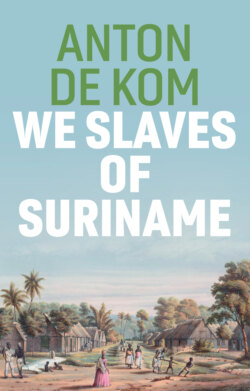Читать книгу We Slaves of Suriname - Anton de Kom - Страница 23
Foreword Judith de Kom
ОглавлениеTRUTH raises itself against the storm that scatters its seeds broadcast.
Rabindranath Tagore
“No people can reach full maturity as long as it remains burdened with an inherited sense of inferiority. That is why this book endeavors to rouse the self-respect of the Surinamese people.” These are the words of Anton de Kom in the section “The History of Our Nation” (p. 85).
He foresaw that the Surinamese people, weighed down by the legacy of colonialism, would have to walk a long, hard road to develop into a full-fledged nation.
We Slaves of Suriname is partly a political commentary on the history of Suriname and partly a cry for justice. Most importantly, perhaps, it was written by a child of Suriname whose dissenting opinions brought the force of colonial oppression down upon him.
Anton de Kom was born in Paramaribo in 1898.
“He was a quiet child. As a boy, he was always lost in a book,” family members say.
His father was a gold-digger. After the gold industry went into decline, he took up farming. There were six children in the family, three boys and three girls. Anton was the eldest son. He went to the Paulusschool in Paramaribo, going on after primary school to “advanced elementary education,” an unusual step for a child from his background in 1910.
Letters of reference indicate that he then became an office worker. His employers included H.C. Cooke, a process server and debt collector; he also spent three years at the Balata Compagnieën Suriname en Guyana.
This last position brought him in touch with the balata bleeders (harvesters of natural rubber). It became his first struggle against exploitation. A worker who knew him said, “He sat in his office and fought for us. He made sure we received the wages to which we were entitled.”
In June 1920, De Kom left for the Netherlands, where he volunteered for the 2nd Cavalry Regiment. After serving for one year, he left the military and found work as an assistant accountant. In January 1926, De Kom married Petronella C. Borsboom. They would have three boys and one girl.
In the 1920s, as one of the few people of color in the Netherlands, he came into contact with the Indonesian nationalist students, such as Mohammed Hatta, who would later play such an important role in the political awakening and liberation of Indonesia. It was partly thanks to them that De Kom’s political consciousness was raised. Another contributing factor was Black activism in the Americas, the work of Marcus Garvey among others. He met left-wing Dutch writers and became a good public speaker, giving lectures on his country, Suriname, and against colonialism.
“A socially engaged man, quiet and modest, but fierce in his response to injustice and exploitation,” say those who knew him.
In December 1932, De Kom returned to his homeland for family reasons. The social situation there was disgraceful. Nothing had changed since 1920: the same high child mortality rate, the same malnourishment, the same unemployment, the same slums, the same poor health care. De Kom decided to found a consulting agency. He listened to the complaints of the people and urged solidarity and organization.
All this was seen by the colonial authorities as a threat. They intervened and arrested De Kom.
On February 7, 1933, hundreds of Afro-, Indo-, and Javanese Surinamese went to the colony’s chief public prosecutor to demand the release of the man who had stood up for their rights. The police unexpectedly opened fire on the crowd. Two people were killed and a number of others were wounded.
After three months’ imprisonment without trial, De Kom was put on a ship to the Netherlands in May 1933. His expulsion, his political activities, and the Great Depression made life far from easy for him and his family in the Netherlands.
In World War II, he opposed fascism with vigor. Because of his writings for the underground press, he was arrested by the Germans in August 1944 and deported to a concentration camp in Germany, where he died in April 1945. Others interned there later described the courage with which De Kom had borne the humiliations of his captivity and recalled how often he spoke of his beloved Suriname.
The value system by which he lived – the unhesitating rejection of poverty, oppression, and exploitation – can still be found in his book We Slaves of Suriname.
The story of his life, despite its tragedy, holds a message of optimism and hope. For a short time, De Kom was able to unite his homeland’s diverse ethnic groups in a struggle for life with dignity!
May this bring the Surinamese lasting hope and inspiration.
On behalf of the De Kom family
March 1981
